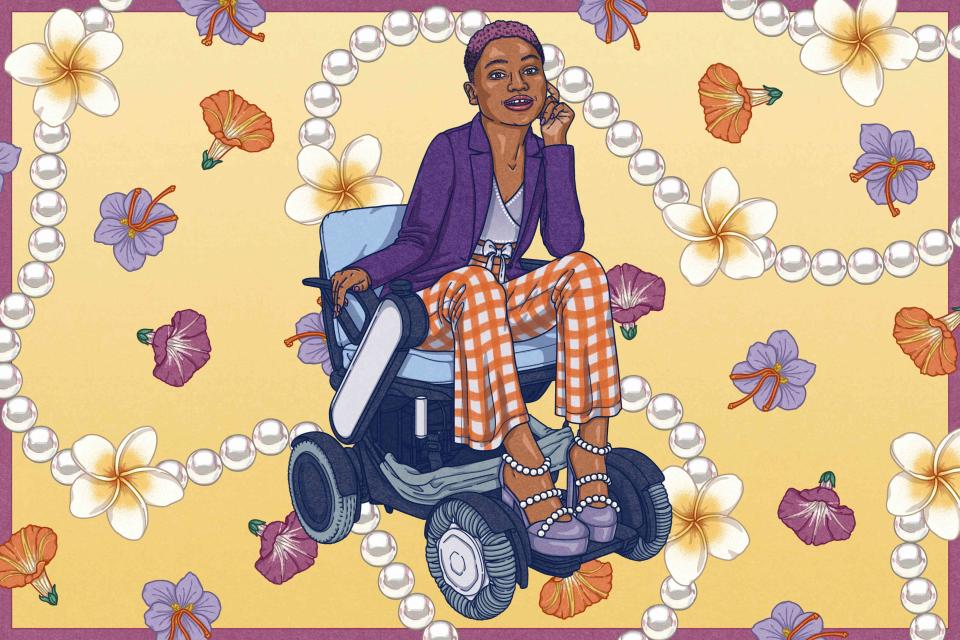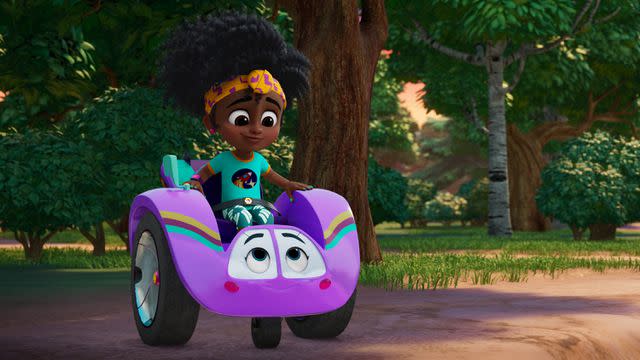I Was Diagnosed With ALS as a Teen—I Never Lost Confidence Thanks to My Family
Actress Lolo Spencer, of Disney Jr.'s 'Firebuds,' says that disabled Black girls need the specific kind of support her family gave her.

Fact checked by Karen Cilli
Trying to remember life before my disability is challenging, laughable really. Before my ALS diagnosis, I have memories of being a typical teenage girl experiencing a dope upbringing with a bunch of friends, having fun. I went to a lot of dances. I had a good time. I was obsessed with B2K, and if it wasn't B2K, it didn't matter to me. Even now, thinking back, I just remember being a teenager—just a little teenage girl from Stockton, California just living.
I was the first person in my family with a disability. I was the only person in my friend group who had a disability. Accessibility wasn’t even a conversation. I didn't even identify as a person with a disability as a teenager because, for me, it was always like, "Oh, Lauren just has this thing going on in her body."
It was more so when things were changing with my body. Everyone else just naturally knew how to adjust, and did things without having to have a daunting conversation. One day, I was responsible for making my plate for dinner, and then the next day, my mom started fixing my plates, but it was still like, ‘You still can't leave until you eat all your food.’
Everyone adjusted so well that I couldn’t even tell the difference.
It wasn't until I lived independently as an adult in a completely different city that I started to recognize being a Black woman with a disability can be quite the task. But the normalcy of my upbringing prepared me for the world. I hope every Black girl like me can have the same experiences because life as a Black woman with a disability is the kind of multi-marginalization you shouldn’t have to feel as a child. It’s all about being a person first and enjoying this rollercoaster called life as much as humanly possible.
My Focus Has Always Been on My Humanity
It's about who I am, how I show up, how I feel about myself, and what my beliefs are. I definitely own my disability and maybe I'm so comfortable with it now that I don't even see it half the time. But yeah, I'm definitely disabled. I use a wheelchair—my disability is visible, but it's one of those things like, yeah, it's there, you understand. Wonderful. Now here's Lauren, the person.
I'm never dismissive of my disability, and I'm not doing it in a way where I'm trying to get people to ignore it because that's not the goal at all. It's just to say, just as much as I am fun, free, exciting, anxious, and discouraged, I am disabled as well. That’s what makes Lauren Spencer. There’s this ignorance of the humanity of our existence, but having to hyper-focus on the medical side of my existence is a huge nope for me. My mission is to shake people up. I'm shaking a table again to get people to remember, Hey, these are humans.

Representation Always Matters
Amazingly, I get to represent someone looking for a person like me. I didn’t have that as a teenager learning my disability. I had, and still have, an amazing support system but actual representation always matters. From sharing my story in book form to simply acknowledging in the most subtle way possible that we are just people, I am grateful for the opportunity to uplift underrepresented folks.
I have the immense joy of starring in Disney Jr.’s Firebuds as Jazzy, a Black girl in a wheelchair. My gosh, she is the cutest thing I've ever seen. I was just so floored. I was just overwhelmed. I sent it to my mom, I sent it to my sister and I was like, "Look at what they're doing."
Then when I read the script of the episode where Jazzy’s mom is twisting her dad's hair in the kitchen, and he has the towel around his shoulders, and she's twisting his hair with the wax. It was just such a Black experience that I had never seen in animation before. And so to see not only Jazzy represent disability, but to have her Black experience also be authentically represented had me like, "Who wrote this? Who did this? Thank you, thank you."
That's the beauty of it all—recognizing that people are different and honoring those differences, experiences, and cultures without focusing on why is it different.
Take Time to Learn and Be Honest
To every young Black girl with a disability: Take the time to learn yourself. Enjoy your body. I know it feels like your body is attacking you. That's not a comfortable feeling and it's hard to find love in that when it's this constant feeling of pain, but understand that there's still room to love your body. It's a constant process. It's every single day,
There is no, "Oh, once I reach this point, I'm never going to be worried about it or think about it or be concerned about it." It's about finding those tools just to make it a little bit easier next time. So, find your tools and fill yourself with the things that bring you joy and make you feel confident.
We can still be as feminine and soft with a disability—it's all a process. But just own it, just own it. That's it.
And just understand that being at the intersection of Black, woman, and disabled is a lot. So don't act like it ain't. There are things we have to deal with as Black people that differ from anybody else's experiences. Then you have a disability on top of that—it is a lot.
But there is a through line for you. And your journey is your journey. Your tools are your tools. So use them, figure out what those are, and enjoy your life as much as possible.
For more Parents news, make sure to sign up for our newsletter!
Read the original article on Parents.

